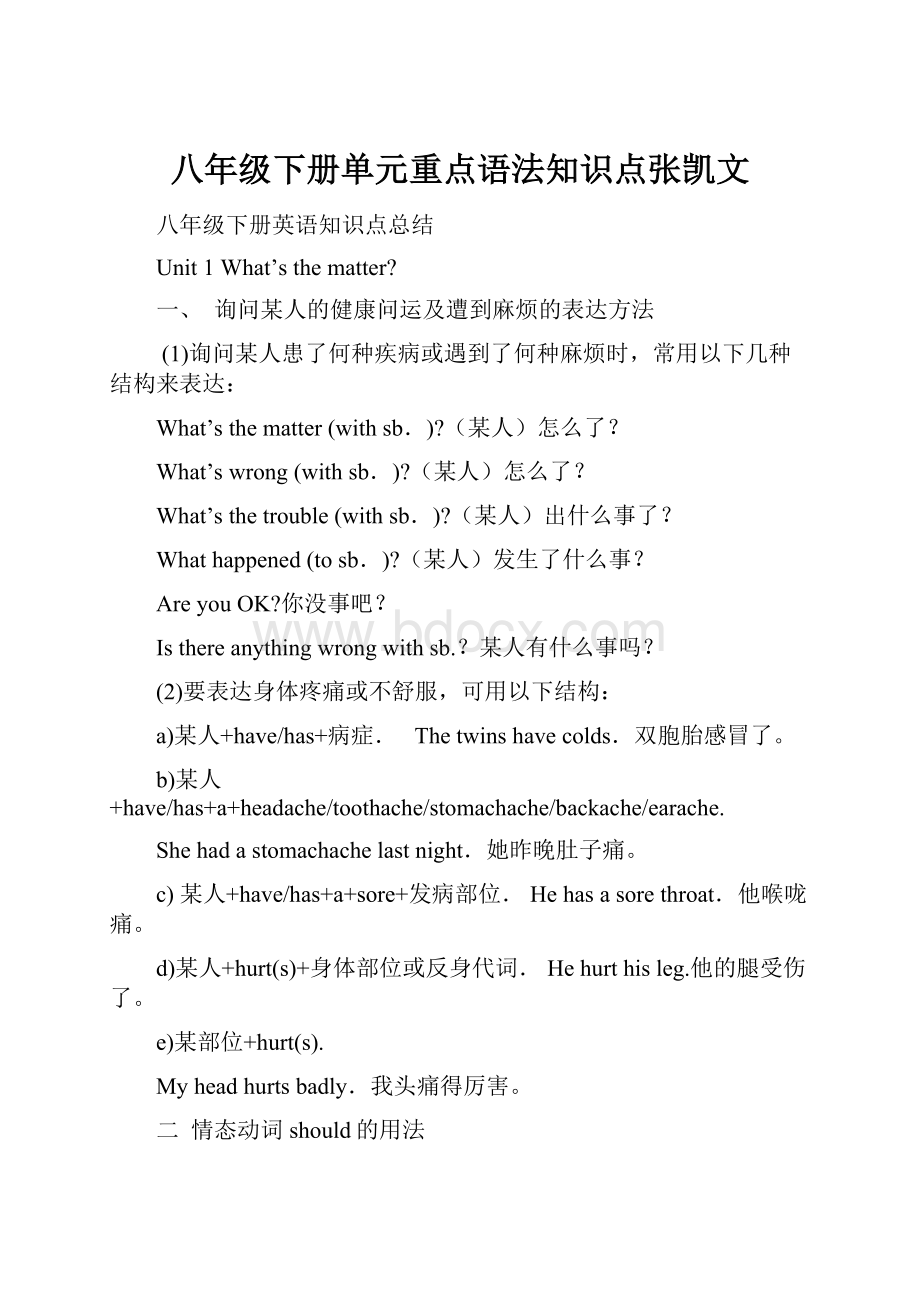八年级下册单元重点语法知识点张凯文.docx
《八年级下册单元重点语法知识点张凯文.docx》由会员分享,可在线阅读,更多相关《八年级下册单元重点语法知识点张凯文.docx(29页珍藏版)》请在冰豆网上搜索。

八年级下册单元重点语法知识点张凯文
八年级下册英语知识点总结
Unit 1 What’s the matter?
一、 询问某人的健康问运及遭到麻烦的表达方法
(1)询问某人患了何种疾病或遇到了何种麻烦时,常用以下几种结构来表达:
What’s the matter (with sb.)?
(某人)怎么了?
What’s wrong (with sb.)?
(某人)怎么了?
What’s the trouble (with sb.)?
(某人)出什么事了?
What happened (to sb.)?
(某人)发生了什么事?
Are you OK?
你没事吧?
Is there anything wrong with sb.?
某人有什么事吗?
(2)要表达身体疼痛或不舒服,可用以下结构:
a)某人+have/has+病症. The twins have colds.双胞胎感冒了。
b)某人+have/has+a+headache/toothache/stomachache/backache/earache.
She had a stomachache last night.她昨晚肚子痛。
c) 某人+have/has+a+sore+发病部位. He has a sore throat.他喉咙痛。
d)某人+hurt(s)+身体部位或反身代词. He hurt his leg.他的腿受伤了。
e)某部位+hurt(s).
My head hurts badly.我头痛得厉害。
二 情态动词should的用法
1.Should为情态动词,意为“应该;应当”,否定式为shouldn’t,其后接动词原形,无人称和数的变化。
常用来表示征询意见、建议、劝告、要求或义务等。
You should drink hot water with honey.你应该喝加有蜂蜜的开水。
He should put his head back他应该把头后仰。
We should try our best to help him.我们应当尽力去帮助他。
You shouldn‘t watch TV.你不应该看电视。
2.Should用于主语为第一人称的疑问句,表示征询意见。
Should I put some medicine on it?
我应当给它敷上药吗?
Should we tell her about it?
我们应该告诉她这件事吗?
其他重点知识点
1.advice [不可数名词]劝告,建议,向…征求意见, give sb. advice 给某人建议;
advise [动词] advise sb. to do sth. 建议某人做某事
advise doing sth
妈妈建议我早点睡__________________________________________
2.be used to sth./ doing sth.习惯于、适应了……
His grandpa was used to country life.
Mary is not used to getting up early in the morning
used to do sth.过去/曾经(常)做某事,表示过去的习惯、动作或状态,并强调现在已经不再存在或发生。
There used to be a cinema here. 这里曾有一个照相机。
They told me stories about the past and how things used to be. 他们告诉我关于这里过去的故事。
3.give up (doing) sth. 放弃(做)某事,give up (playing) computer games;
give up后可接名词、代词和动词ing形式,也可不接
爸爸戒烟了。
____________________________________________
Unit 2 I'll help clean up the city parks
动词不定式
A.作主语——为避免句子的头重脚轻,常用it作为形式主语,而真正的主语动词不定式后置。
常用句型:
It +be+adj./n.+(for/of sb.) to do sth./It takes sb. some time to do sth.
B. 作宾语——动词want, decide, hope, ask, agree, choose, learn, plan, need, teach, prepare„常接动词不定式作宾语。
C. 作(后置)定语——常用于“have/has+sth.+to do”或“enough+名+to do”
“It’s time to do sth.”等结构中。
D. 作宾语补足语——tell, ask, want, invite, teach, like, call等可接带to的动词不定式作宾语补足语,构成tell/ask/want /call/invite sb. to do sth.结构。
【注意】动词不定式作使役动词和感官动词的宾语补足语时应省去to:
“一感(feel),二听(listen to, hear),三让(let, make, have,,四看(look at, see, watch, notice),半帮助(help)”。
E. 动词不定式作状语
主要用来修饰动词,表示目的,结果或原因。
为了强调目的,有时可以把动词不定式放在句首,或在不定式前加in order (to) 或so as (to) “为了,目的是”。
常用结构有too + adj./adv. + to do sth.等。
F. 固定句式中动词不定式的用法 常见的形式有:
had better (not) do sth./Would you like to do sth.?
/Why not do sth.?
/Would you please (not) do sth.?
等。
其他重点知识点
1.cheer (sb.) up(让某人)变得高兴;振奋起来The good news cheered up everyone in our class.
2.care for sb./sth.照顾;照料…… =take care of=look after
【动词】care about sb./sth.关心,在意某人/事
3.make a difference to…对……有影响;对……有作用,difference前可以用no, any, some, much等修饰,如 The rain made no difference to the game. Hard-working makes much difference to study.
4. difficulty【可数/不可数】表示抽象意义的―困难‖时为不可数;表示具体的―难题、难事‖时为可数; have difficulty (in) doing sth.= have trouble (in) doing sth. 做某事有困难
他很难入睡。
____________________________________________________________
Unit 3 Could you please clean your room
Could you please...?
句型
(1)请求别人时通常用此句型,也可以说:
Can you...please?
情态动词could或can在这里均表示请求,在意思上无区别,但是用could在于其上显得更委婉、客气、诚恳。
在日常生活中常使用could you/I...?
若在句末加上please,则显得更礼貌。
Could you help me find my book,please?
你能帮我找到我的书吗?
(2)对could you/I...?
的问句作出肯定回答,常用“sure/certainly/of course”等;如果作否定回答,常用“sorry或oh,please don’t”。
一般不用no开头,用no显得语气生硬、不礼貌。
(3)表示请求的句式:
Would you like to do...?
Would you mind doing...?
Let’s do.... Shall I/we do...?
Please do...(祈使句前加please)
提示:
could you please...与could I Please...两种问句,前者是请求别人帮忙的句式,后者是有礼貌地向别人请求允许的交际用语。
试比较:
Could you please help me?
请你帮我一下好吗?
Could I please invite my friends to my birthday party,Mom?
妈妈, 我能邀请我的朋友参加我的生日聚会吗?
其他重点知识点
1.finish v 结束;完成 finish doing sth 做完某事
— Can you finish __reading__ these books before 10 o'clock?
2.neither用法
(1)表达“…也不……”则用“Neither/Nor+be/V助/V情+主”
我明天不去上班,他也一样。
__________________________________________________
(2)neither两者都不neither…nor…既不…也不…,
连接两个词做主语,谓语动词的单复数由后一个主语确定NeitherTomnorJimisastudent
你们和他都不会影响我。
___________________________________________
(3)neitherof…也可以表示两者都不,但谓语动词的单复数根据neither来确定。
例如:
Neitherofthemarestudents.
我父母都不介意周末玩电脑游戏。
______________________________________________
拓展:
either,也,(两者中的)任何一个
(1)Ihaveacold,shehasacold,too.
Ididn’thaveacold,shedidn’thaveacold,either.
(2)either…or…要么…要么…,或者…或者…连接两个词做主语,谓语动词的单复数由后一个主语确定
WeeitherwatchTVorplaycomputeronweekends.
EitheryouorIamastudent.
(3)eitherof…也可以表示两者都不,但谓语动词的单复数根据neither来确定。
Eitherofmyparentsisateacher.我父母中有一个是老师。
3.find+宾语+宾语补足语
【注】find→found→foundv寻找
(1)findsb.doingsth发现某人正在做某事
学生们发现老师正在修理收音机。
___________________________________________________
(2)findsb.dosth发现某人做了某事
我的好朋友发现我看了他的日记。
__________________________________________________
(3)findit+adj.+todosth发现做某事很……
◆finditdifficult/hardtodosth发现做某事很困难
很多女性都发现学习开车挺难的。
__________________________________________________
4.borrow/lend/keep
(1)borrow借入,与from连用,尤指主语“【借进来”】
borrowsthfromsb.从某人那里借某物Youcanborrowthebookfromthelibrary.
(2)lend借出,与to搭配【指借出去】lendsbsth=lendsthtosb把某物借给某人
Hedoesn’twanttolendhisbooktoothers.
(3)keep保留,保存(延续动词,可以与表示一段时间的状语连用)【指借一段时间】
【记】Iwantto__________abikefrommyfriendbuthedidn’t____ittome,BecauseTomhad_____itfortwodays.
5.spendpaycosttake讲解
(1)spend→spent→spentv花费,主语是人
◆sb.+spend+时间/钱+onsthHespendstoomuchtimeonthecomputergames.
◆sb.+spend+时间/钱+(in)doingsth
我想花些时间看看书。
____________________________________________________________
(2)pay→paid→paidv支付,主语是人
◆sb.+pay+钱+forsthIpay10yuanforthebook.
(3)cost→cost→costv花费,主语是某物或某事
◆sthcostsb.+钱某物花费某人多少钱Anewcomputercostsmealotofmoney.
(4)take→took→takenv花费◆Ittakes/tooksb.sometimetodosth.做某事花费某人多长时间
Ittakeshim3hourstodohishomework.
1.()Remembertospendsometime__yourlovedones,becausethey’renotgoingtobearoundforever.
A.fromB.withC.inD.on
2.()—Howmuchdidyou____forthiscomputer?
—Fivehundreddollars.
A.costB.takeC.spendD.pay
3.()I_____10yuanforthatbook.A.spentB.paidC.costD.take
4.()Jimspenttwohours___thathouse.A.todrawB.drawsC.drawD.drawing
5.()Shespent100dollarsonherdress.A.cost;forB.paidforC.took;toD.use;for
6.--Areyoualwaysonline?
--Yes.It____mealotoftimetoreadthewebpagesIlikes.It’sthebestwaytokilltime.
A.takesB.spendsC.usesD.pays
6.inorderto“目的是;为了”后接动词原形。
inordertodosth为了做某事
7.dependon依靠;信赖
8.动词或动词短语做主语时动词需加ing,把它看做单数,动词需用单数。
例如:
Dingsportseverydaykeepsushealthy,
9.the+比较级,the+比较级“越......越......”
你吃的越多,你就会越胖。
__________________________________________
Unit 4 Why don't you talk to your parents?
1.提建议向别人发出邀请,请求,建议,或征求某人的意见的其他表达方式:
How /what about doing sth.?
(about是个介词,可跟名词或动名词)“„怎么样?
”
You’d better (not) do something.“你最好(不)做某事”
Would you like sth „?
:
“你想要某物
Let‟s do sth„?
做…..好吗?
2.until, so that ,although引导的状语从句:
1)until:
在带有till或until引导的时间状语从句里,如果主句用肯定式,其含义是“一直到„„时”,谓语动词只能用延续性动词。
如果主句用否定式,其含义是“直到„„才„„”, “在„„以前不„„”, 谓语动词可用瞬间动词。
Don‟t get off until the bus stops. 知道车停了才能下车。
2)so that引导目的状语从句(为了,以便)例如:
He studies hard so that he could work better in the future
3)although的用法意思相当于though(尽管,虽然),引导让步状语从句。
引导的从句不能与并列连词but,and, so等连用,但可以和yet, still等词连用。
例如:
Although he was tired, he went on working.尽管他很累,但是他继续工作。
其他重点知识点
1.allowv允许
allowdoingsth允许做某事Theydon’tallowsmoking.
allowsb.todosth允许某人做某事MymotherallowsmetowatchTV.
beallowedtodosth被允许做某事IwasallowedtowatchTV.
2beangrywithsb.=bemadatsb.对某人生气【with后接人】
beangryat/aboutsth对某事感到生气【at后接事】
beangrytodosth做某事感到生气
3.insteadof+n/doing代替,而不是,放在句中
insteadof为介词短语,后面一般接名词、代词、介词短语或动名词形式。
Shewrotetohiminsteadofcallinghim.=Shedidn’tcallhim.Shewrotetohiminstead.她没有给他打电话,而是给他写了封信。
()Healthisveryimportanttous.Weshouldeatmorevegetablesandfruit_____richfood.A.insteadB.insteadofC.becauseofD.because
【2011江苏徐州4】14.We’vegotnocoffee.Let’shavetea_______.
A.eitherB.howeverC.yetD.instead
4.worryabout=beworriedabout为……担心
①Don’tbe_________(worry).You’llcatchupwithothers.
()②Don’t____aboutthingssomuch.Itwillmakeyoustressedout.
afraidB.worryC.worriedD.Terrified
【2013绍兴】91.-Youlook_________.What'sup,sir?
-Ican'tfindmyticket,butit'stimetocheckin.A.sleepyB.hungryC.tiredD.worried
5.in one’s opinion 以某人的观点; 在某人看来
6.send sb. sth = send sth to sb. 送给某人某物
类似的动词有:
show (展示; 给…看) give (给) lend (借出) offer(提供) return (归还) tell ( 告诉)
( ) Please send a photo of your family ____ me. A. for B. at C. to D. with
【2011四川绵阳】15. ---- Drunken drive is dangerous, isn’t it?
---- Yeah. That why drunken drivers_____ to prison even without causing accidents.
A. sent B. are sent C. send D. are sending
7.all kinds of 各种各样的
【拓展】kind
(1) n 种类
kind of +adj.有点,有几分,kind of cold 有点冷 a kind of 一种的,某种的 all kinds of 各种各样的
different kinds of 不同种类的 What kind of…?
那种
—What ____ animals do you like?
— Monkeys. I think they’re _____ clever.
A. kind of; kind of B . a kind of a kind of C. kind of; a kind D. a kind of kind of
Unit 5 What were you doing when the rainstorm came?
过去进行时
1. 基本概念:
过去进行时表示在过去某一时刻或一段时间内正在进行的 动作。
这一特定的过去时间除有上下文暗示以外, 一般用时间状语来表示。
2. 结构 was / were ( not ) + 动词-ing
3. 句式 肯定式:
I/He/She/It was working. We/You/They/ were working.
否定式:
I/He/She/It was not working. We/You/They/ were not workin